

![]()
Children who were rescued by Galle Police from an unregistered home allegedly run by a Buddhist monk at Batagamasla, Galle.
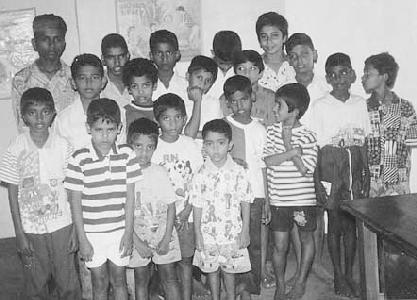 Pic. by
Gamini Mahadura
Pic. by
Gamini Mahadura
The monk was produced in
court and released on a bail of Rs. 25,000 by the Galle Magistrate while the
children have been sent to other homes.
Picture shows the children at the Galle Police station before they were sent to other homes.
This raid was the latest in a series, especially in the Galle and Kalutara areas, where child abuse and prostitution are known to be rampant with Sri Lanka being advertised abroad as a paradise for child sex perverts.
Ainsley de Silva, a veteran newspaper office manager for more than three decades, passed away suddenly on Thursday.
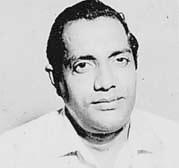 Joining Independent
Newspapers Ltd., soon after the Group was founded in the early 1960s, the
heavily built, but softspoken Ainsley, often dressed in white, rose quietly to
become a key figure in the administration.
Joining Independent
Newspapers Ltd., soon after the Group was founded in the early 1960s, the
heavily built, but softspoken Ainsley, often dressed in white, rose quietly to
become a key figure in the administration.
With the Independent Newspaper Group at one time having 17 publications, Ainsely as Time Office Manager and paymaster general played an anchor role, especially on pay day, when everybody queued before him.
The funeral took place yesterday morning at the Nayakakande burial grounds in Hendala. Ainsley leaves his wife Consey and children, Christine, Russel, Nilanka and Nilushie.
Canada is taking urgent action to protect the Toronto-based Sri Lankan journalist. D. B. S. Jeyaraj and others who face threats from the LTTE, the Sri Lankan High Commission in Ottawa said.
The action comes after the High commission informed the Ottawa Govt. that the LTTE was reportedly threatening to kill Mr. Jeyaraj apparently because the group does not agree with the views he expresses in a regular column he writes for a Sri Lankan newspaper.
The Ottawa Govt. has assured that all steps would be taken to protect the democratic freedom of all those living in Canada. The High Commission in a statement said it had provided information to the Canadian Govt. regarding LTTE suspects who may be behind the death threats .
A six per cent increase in diabetic deaths has been recorded annually, according to resource persons in the health sector.
A diabetes awareness programme, combined with a free blood screening clinic has been organised by the Lions Club International district 306 B of Sri Lanka, to mark World Diabetes Day. The awareness programme will take place at St. Peter's College, Bambalapitiya on November 23 from 7.30 p.m. onwards.
United States Court of Appeal
District of Columbia Circuit
Washington, D.C.
Dear Honourable Judges:
Re: Letter of Authorization for the Filing of a Legal Action and Representation of the Liberation Tigers of Tamil Eelam in the Judicial Review of the Terrorist Designation of the Organization Pursuant to Section 219 of the Anti-terrorism and Effective Death Penalty Act of 1996, (Public Law 104-132, April 24, 1996).
On October 8, 1997, the United States Secretary of State, Honourable Madeleine Albright, pursuant to Section 219 of the Anti-Terrorism and Effective Death Penalty Act, designated the Liberation Tigers of Tamil Eelam (the "LTTE" defined) as a terrorist organization along with 29 other organizations.
The LTTE is a national liberation movement, which is presently involved in armed conflict with the government of Sri Lanka in order to realize the right of the Tamils of Sri Lanka for self-determination on the island of Sri Lanka.
Armed resistance
The formation of the Tamil armed resistance movement was in response to the repression and violence of the Sinhala-dominated Sri Lankan government. It should be analyzed within the context of the historical development of the Tamil struggle for self-determination. The Tamil struggle for self-determination has an evolutionary history of nearly half a century. It is a history characterized by state repression and the ensuing resistance by Tamils. The political struggles in the early periods were peaceful, democratic, non-violent campaigns which later assumed the form of armed resistance as the military repression by the state intensified to genocidal proportions.
Following the independence of the Island in 1948, Sinhala State repression against the Tamils began to manifest itself in earnest. Through discriminatory legislation, and various other unconstitutional measures, successive Sinhala majority governments unleashed a systematic form of oppression that deprived the Tamils of their linguistic, educational and employment rights. In addition, the aggressive state aided colonization, by the Sinhalese, of Tamil areas not only deprived the Tamils of their rights to their historical lands, but also changed the national composition in the Tamil regions rendering them a minority traditional Tamil regions.
The Tamils took up arms when they were presented with no alternative; when peaceful forms of democratic political agitations were violently repressed; when constitutional paths and parliamentary doors were effectively closed. The event which climaxed the constitutional process to oppress the Tamil people was the new Republican Constitution of 1972 which was adopted. In a constitutional conference outside the Parliament without the support of elected Tamil representatives. By this unilateral action, which eliminated the protection for Tamils included in the Soulbury Constitution, Sri Lanka broke the covenant which the Tamil people made with the Sinhala people and the British when Sri Lanka became independent in 1948. The secular position of the state was changed in favour of Buddhism, the religion of the Sinhalese. Since 1961, after Satyagraha, a non-violent civil disobedience campaign by the Tamils, the Tamil area came under army occupation.
Human rights violations
In the war to suppress the Tamils, successive Sri Lankan governments have used their security forces to commit massive human rights violations and war crimes against the Tamils. These violations have included extrajudicial killings, disappearances, torture, rape, mass arrests, detention, assault, and harassment. In addition, there has been indiscriminate serial bombing and heavy artillery shelling of civilians. The denial of food, fuel, electricity, medicine and other essential supplies through an economic embargo since 1990 have been used as instruments of war. Those actions have caused deaths, a great deal of suffering and undue hardships for the Tamil civilian population of the North and East.
It is gratifying that those violations are now receiving recognition from the international community despite desperate cover up efforts by the Government through censorship and denial of access to the North East. Recent reports by the U.S. State Department the U.S. Committee for Refugees (USCR), the British Refugees Council and Amnesty International have noted the sharp deterioration in the human rights performance of the Government. The US State Department's Human Rights Report for 1996, even though it failed to use information compiled and regularly reported by the LTTE, noted the "deterioration in the human rights record of the security forces" and "the impunity for those responsible for human rights abuses." It documents the deterioration and the impunity in all categories of violations by security forces ranging from killings, disappearances, torture and rapes to mass arrests, and detention.
LTTE-proven Politico-Military Organization
As an organization committed to the principle of self-determination and engaged in a politico-military struggle over a period , the LTTE has earned the status of a national liberation movement. Having emerged in the early seventies and having struggled for over two decades to win the political rights of the Tamil people, the LTTE enjoys widespread popular support in Tamil Eelam and among the international Tamil Community.
The LTTE on 24 February 1988 transmitted its notice of acceptance of the Geneva Convention I-IV of 1948 and the Protocol Additional I and II to the Geneva Conventions to United Nations Head Quarters and to the ICRC. LTTE has entered into Agreements with international humanitarian organizations. LTTE believes that as a national liberation movement it should be treated as privileged combatant not as a criminal organization The LTTE never targets civilians who take no active part in the conflict.
Thus during 1990 and1995 even under the very difficult conditions imposed by the economic embargo and the war the LTTE conducted an effective civil administration in the North totally free of the corruption and nepotism which have plagued Sri Lanka. It was based on a system of participatory democracy with all segments of society, from the grassroot level to professionals having the opportunity to participate in non-military decisions.
It is indeed regrettable that the American Nation which secured its own independence after a violent struggle for self-determination and has ever since championed the cause of human freedom has chosen, to characterize and discredit the legitimate struggle of the Tamil people seeking to determine their political status as a phenomenon of terrorism. We consider this indictment by the U.S Department of State unfair and unfounded.
We understand that Section 219 (b) of the Anti-Terrorism act provides an opportunity to challenge the designation in your court. We feel we have a moral obligation to challenge it. We believe we can get justice in your Court.
Sincerely Yours
Velummylum Manoharan, Representative, Liberation Tigers Tamil Eelam International Secretariat ,211, Katherine Road, London, 61BU. U.K.
A couple of ministers, taking cover under parliamentary privilege, have outdone themselves in spewing out seemingly vulgar and racial comments in the defence of an embattled colleague.
In what would be tantamount to criminal libel, outside the august Assembly, two senior government ministers have had the temerity to blatantly and unfairly attack the reputation of two remarkable Sri Lankan women whose accomplishments have brought honour to the country.
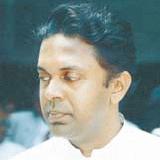 Mangala
Samaraweera
Mangala
Samaraweera
I am profoundly shocked at Media
Minister Mangala Samaraweera's description of Susanthika Jayasinghe, as a "mentally
deranged woman". Minister Samaraweera has injudiciously dismissed
Susanthika's allegations of sexual harassment, by stating that no one would have
wanted to have sex with Susanthika, "because she looks like a black South
African man".
Minister Jeyaraj Fernandopulle will, I am certain, bring the wrath of every right-thinking citizen on himself with his crude and scurrilous allegations against the character of Rosie Senanayake, another exceptional Sri Lankan woman.
Both Ms Jayasinghe and Ms Senanayake, in the minds of all Sri Lankans excepting the snide minority of political sycophants will be remembered for their courage, panache and confidence in bringing glory and titles to their country.
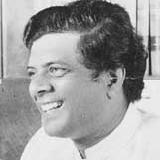 Jeyaraj
Fernandopulle
Jeyaraj
Fernandopulle
For a senior minister to 4LABEL
Susanthika Jayasinghe as "a black South African man" is doubtless a
personal, undiplomatic, unfair and immature attack, on one of Sri Lanka's
greatest athletes. It also smacks of unmitigated racialism.
In any event, sexual and romantic tastes are subjective, and a great many women and (may I hasten to add) even some men find black South African males stunningly attractive - some more than others.
It would also seem incredulous that the technique of this remarkable woman athlete, Susanthika, and her disciplined temperament could spring from a demented mind.
Apart from being small-minded Minister Samaraweera has displayed extremely poor diplomatic skills by openly disparaging the coloured people of an entire friendly nation, which upto now has had excellent relations with Sri Lanka.
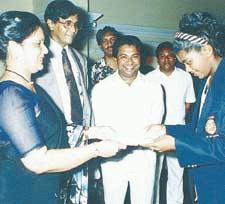 The way they
were : President Kumaratunga, S.B.Dissayake and Susanthika
The way they
were : President Kumaratunga, S.B.Dissayake and Susanthika
One
would wonder, how Foreign Minister Lakshman Kadirgamar would be able to explain
the mindset of his cabinet colleague, who has openly spelt out his personal
view: on the looks and colour of the South African people.
And come to think of it, what an analogy!
To be sure, the Sri Lankan nation, does not share his personal views, which are best kept to himself.
Minister Fernandopulle's totally unwarranted and reprehensible character assassination of Ms Senanayake, will be certain to trigger a widespread outcry for self-imposed regulations by political parties over the abuse of parliamentary privilege.
After all, such imprecations only go to show the dangers of how parliamentary privilege could be reduced to the level of depravity. As ambassadors of goodwill, both Ms Jayasinghe and Ms Senanayake have few peers.
They are both in the estimation of most Sri Lankans crisp, clean and decisive in contrast to the jaded and sulky political soap opera that has played in tandem.
They are also an example to all politicians, who have done hardly anything but have endeavoured to bask in their reflected glory and whose antics have been found grievously wanting.
Continue to the News/Comment page 3
Return to the News/Comment contents page
![]()
| HOME PAGE | FRONT PAGE | EDITORIAL/OPINION | PLUS | TIMESPORTS
Please send your comments and suggestions on this web site to
info@suntimes.is.lk or to
webmaster@infolabs.is.lk